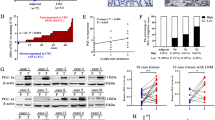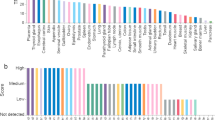Abstract
The role of peroxisome proliferator-activated receptor-β/δ (PPAR-β/δ) in the pathogenesis of colon cancer remains highly controversial. This study specifically silenced the PPAR-β expression in three colon cancer cell lines with different metastatic potentials. Although PPAR-β knockdown resulted in more malignant morphological changes, bigger colony sizes and lower carcinoembryonic antigen (CEA) secretion, and enhanced the cell–fibronectin adhesion, cell invasion and migration were unaffected. These effects were stronger in poorly metastatic cell lines compared with highly metastatic ones. Simultaneously, PPAR-β knockdown decreased the mRNAs encoding adipocyte differentiation-related protein and liver fatty acid binding protein, and increased the mRNA of ILK, whereas the mRNAs encoding integrin-β1 and angiopoietin-like 4 were unchanged. Using immunohistochemistry, we determined that the intensity of PPAR-β expression was stronger in rectal cancers with better differentiation than in those with poor differentiation, and was stronger in early-stage tumors than in advanced ones. Together, these findings consistently indicate that PPAR-β may facilitate differentiation and inhibit the cell–fibronectin adhesion of colon cancer, having a role as an inhibitor in the carcinogenesis and progression of colorectal cancer. Interestingly, PPAR-β seems to have a more important role in poorly metastatic cells than in highly metastatic ones.
This is a preview of subscription content, access via your institution
Access options
Subscribe to this journal
Receive 50 print issues and online access
$259.00 per year
only $5.18 per issue
Buy this article
- Purchase on Springer Link
- Instant access to full article PDF
Prices may be subject to local taxes which are calculated during checkout






Similar content being viewed by others
References
Aung CS, Faddy HM, Lister EJ, Monteith GR, Thomas-Roberts SJ . (2006). Isoform specific changes in PPARa and b in colon and breast cancer with differentiation. Biochem Biophys Res Commun 340: 656–660.
Alexandrova AY . (2008). Evolution of cell interactions with extracellular matrix during carcinogenesis. Biochemistry 73: 733–741.
Barak Y, Liao D, He W, Ong ES, Nelson MC, Olefsky JM . (2002). Effects of peroxisome proliferator-activated receptorβ on placentation, adiposity, and colorectal cancer. Proc Natl Acad Sci USA 99: 303–308.
Barish GD, Narkar VA, Evans RM . (2006). PPARβ: a dagger in the heart of the metabolic syndrome. J Clin Invest 116: 590–597.
Burdick AD, Kim DJ, Peraza MA, Gonzalez FJ, Peters JM . (2006). The role of peroxisome proliferator-activated receptor-d in epithelial cell growth and differentiation. Cell Signal 18: 9–20.
Bordonaro M, Lazarova DL, Augenlicht LH, Sartorelli AC . (2002). Cell type- and promoter-dependent modulation of the Wnt signaling pathway by sodium butyrate. Int J Cancer 97: 42–51.
Camps J, Morales C, Prat E, Ribas M, Capellà G, Egozcue J et al. (2004). Genetic evolution in colon cancer KM12 cells and metastatic derivates. Int J Cancer 110: 869–874.
Cordes N, van Beuningen D . (2003). Cell adhesion to the extracellular matrix protein fibronectin modulates radiation-dependent G2 phase arrest involving integrin-linked kinase (ILK) and glycogen synthase kinase-3beta (GSK-3beta) in vitro. Br J Cancer 88: 1470–1479.
Chen LC, Hao CY, Chiu YS, Wong P, Melnick JS, Brotman M et al. (2004). Alteration of gene expression in normal-appearing colon mucosa of APC(min) mice and human cancer patients. Cancer Res 64: 3694–3700.
Cheng L, Ding G, Qin Q, Huang Y, Lewis W, He N et al. (2004). Cardiomyocyte-restricted peroxisome proliferator-activated receptor-delta deletion perturbs myocardial fatty acid oxidation and leads to cardiomyopathy. Nat Med 10: 1245–1250.
Di-Poi N, Tan NS, Michalik L, Wahli W, Desvergne B . (2002). Antiapoptotic role of PPARβ in keratinocytes via transcriptional control of the Akt1 signaling pathway. Mol Cell 10: 721–733.
Doherty UO, Swiggard WJ, Malim MH . (2000). Human immunodeficiency virus type 1 spinoculation enhances infection through Virus Binding. J Virol 74: 10074–10080.
Galaup A, Cazes A, Le Jan S, Philippe J, Connault E, Le Coz E et al. (2006). Angiopoietin-like 4 prevents metastasis through inhibition of vascular permeability and tumor cell motility and invasiveness. Proc Natl Acad Sci USA 103: 18721–18726.
Gupta RA, Tan J, Krause WF, Geraci MW, Willson TM, Dey SK et al. (2000). Prostacyclin-mediated activation of peroxisome proliferator-activated receptor β in colorectal cancer. Proc Natl Acad Sci USA 97: 13275–13280.
Hannigan GE, Leung-Hagesteijn C, Fitz-Gibbon L, Hannigan GE, Leung-Hagesteijn C, Fitz-Gibbon L et al. (1996). Regulation of cell adhesion and anchorage-dependent growth by a new beta 1-integrin-linked protein kinase. Nature 379: 91–96.
Hannigan G, Troussard AA, Dedhar S . (2005). Integrin-linked kinase: a cancer therapeutic target unique among its ILK. Nat Rev Cancer 5: 51–63.
Harman FS, Nicol CJ, Marin HE, Ward JM, Gonzalez FJ, Peters JM . (2004). Peroxisome proliferator-activated receptor-delta attenuates colon carcinogenesis. Nat Med 10: 481–483.
He TC, Timotly AC, Bert V, He TC, Chan TA, Vogelstein B et al. (1999). PPARdelta is an APC regulated target of nonsteroidal anti-inflammatory drugs. Cell 99: 335–345.
Hinnebusch BF, Meng SF, Wu JT, Archer SY, Hodin RA . (2002). The effects of short-chain fatty acids on human colon cancer cell phenotype are associated with histone hyperacetylation1. J Nutr 132: 1012–1017.
Holly EH, Michael GB, Andrew NB, Timothy MW, Frank JG, Jeffrey MP . (2008). Ligand activation of peroxisome proliferator-activated receptor-b/d (PPARb/d) and inhibition of cyclooxygenase 2 (COX2) attenuate colon carcinogenesis through independent signaling mechanisms. Carcinogenesis 29: 169–176.
Jeffrey MP, Holly EH, Frank JG . (2008). Role of peroxisome-proliferator-activated receptor β/δ (PPARβ/δ) in gastrointestinal tract function and disease. Clin Sci 115: 107–127.
Kim DJ, Akiyama TE, Harman FS, Kim DJ, Akiyama TE, Harman FS et al. (2004). Peroxisome proliferator-activated receptor β-dependent regulation of ubiquatin C expression contributes to attenuation of skin carcinogenesis. J Biol Chem 279: 23719–23727.
Kim DJ, Bility MT, Billin AN, Willson TM, Gonzalez FJ, Peters JM . (2006). PPARβ selectively induces differentiation and inhibits cell proliferation. Cell Death Differ 13: 53–60.
Kliewer SA, Forman BM, Blumberg B, Kliewer SA, Forman BM, Blumberg B et al. (1994). Differential expression and activation of a family of murine peroxisome proliferator-activated receptors. Proc Natl Acad Sci USA 91: 7355–7359.
Lawrie LC, Dundas SR, Curran S, Murray GI . (2004). Liver fatty acid binding protein expression in colorectal neoplasia. Br J Cancer 90: 1955–1960.
Morikawa K, Walker SM, Nakajima M, Pathak S, Jessup JM, Fidler IJ . (1988). Influence of organ environment on the growth, selection, and metastasis of human colon carcinoma cells in nude mice. Cancer Res 48: 6863–6871.
Orner GA, Dashwood WM, Blum CA, Diaz GD, Li Q, Dashwood RH . (2003). Suppression of tumorigenesis in the Apc(min) mouse: down-regulation of beta-catenin signaling by a combination of tea plus sulindac. Carcinogenesis 24: 263–267.
Ouyang NT, Williams JL, Rigas B . (2006). NO-donating aspirin isomers downregulate peroxisome proliferator-activated receptor (PPAR) delta expression in APCmin/t mice proportionally to their tumor inhibitory effect: Implications for the role of PPARd in carcinogenesis. Carcinogenesis 27: 232–239.
Park EY, Dillard A, Williams EA, Wilder ET, Pepper MR, Lane MA . (2005). Retinol inhibits the growth of all-trans-retinoic acid–sensitive and all-trans-retinoic acid–resistant colon cancer cells through a retinoic acid receptor–independent mechanism. Cancer Res 65: 9923–9933.
Peraza MA, Burdick AD, Marin HE, Gonzalez FJ, Peters JM . (2006). The toxicology of ligands for peroxisome proliferator-activated receptors (PPAR). Toxicol Sci 90: 269–295.
Piqueras L, Reynolds AR, Hodivala-Dilke KM, Alfranca A, Redondo JM, Tanabe T . (2007). Activation of PPARβ/β induces endothelial cell proliferation and angiogenesis. Arterioscler Thromb Vasc Biol 27: 63–69.
Reddig PJ, Juliano RL . (2005). Clinging to life: cell to matrix adhesion and cell survival. Cancer Metastasis Rev 24: 425–439.
Reed KR, Sansom OJ, Hayes AJ, Gescher AJ, Winton DJ, Peters JM et al. (2004). PPARy status and Apc-mediated tumourigenesis in the mouse intestine. Oncogene 23: 8992–8996.
Schmuth M, Haqq CM, Cairns WJ, Holder JC, Dorsam S, Chang S et al. (2004). Peroxisome proliferator-activated receptor (PPAR)-beta/delta stimulates differentiation and lipid accumulation in keratinocytes. J Invest Dermatol 122: 971–983.
Schroeder F, Atshaves BP, Starodub O, Boedeker AL, Smith III RR, Roths JB et al. (2001). Expression of liver fatty acid binding protein alters growth and differentiation of embryonic stem cells. Mol Cell Biochem 219: 127–138.
Shao JY, Sheng HM, DuBois RN . (2002). Peroxisome proliferator-activated receptors modulate K-Ras-mediated transformation of intestinal epithelial cells. Cancer Res 62: 3282–3288.
Takahashi S, Tanaka T, Kodama T, Sakai J . (2006). Peroxisome proliferator-activated receptor β (PPARβ), a novel target site for drug discovery in metabolic syndrome. Pharmacol Res 53: 501–507.
Targett-Adams P, McElwee MJ, Ehrenborg E, Gustafsson M, Palmer CN, McLauchlan J . (2005). A PPAR response element regulates transcription of the gene for human adipose differentiation-related protein. Biochim Biophys Acta 1728: 95–104.
van de Wetering M, Sancho E, Verweij C, de Lau W, Oving I, Hurlstone A et al. (2002). The β-catenin/TCF-4 complex imposes a crypt progenitor phenotype on colorectal cancer cells. Cell 111: 241–250.
Worth DC, Parsons M . (2008). Adhesion dynamics: Mechanisms and measurements. Int J Biochem Cell Biol 40: 2397–2409.
Wozniak MA, Modzelewska K, Kwong L, Keely PJ . (2004). Focal adhesion regulation of cell behavior. Biochim Biophys Acta 1692: 103–119.
Yang L, Zhou ZG, Luo HZ, Zhou B, Xia QJ, Tian C . (2006). Quantitative analysis of PPAR-β mRNA by real-time RT-PCR in 86 rectal cancer tissues. Eur J Surg Oncol 32: 181–185.
Yang L, Zhou ZG, Zheng XL, Wang L, Yu YY, Zhou B et al. (2008). RNA interference against peroxisome proliferator-activated receptor β gene promotes proliferation of human colorectal cancer cells. Dis Colon Rectum 51: 318–326.
Yeatman TJ, Cher ML, Mao WG, Wloch M, Tedesco T . (1996). Identification of genetic alterations associated with the process of human experimental colon cancer liver metastasis in the nude mice. Clin Exp Metastasis 4: 246–252.
Acknowledgements
We thank Petter Hammar (Linköping University, Sweden) for his help in lentivirus construction, and thank Prof IJ Fidler (Anderson Cancer Center, Houston, TX) for offering KM12 cell lines. This study was financially supported by grants from the Swedish Cancer Foundation, Swedish Research Council and the Health Research Council in the South-East of Sweden, the Natural Science Foundation of China (Grant No. 30801332) and the National Science Foundation for post-doctoral Scientists of China (Grant No. 20070421149).
Author information
Authors and Affiliations
Corresponding author
Additional information
Supplementary Information accompanies the paper on the Oncogene website (http://www.nature.com/onc)
Supplementary information
Rights and permissions
About this article
Cite this article
Yang, L., Olsson, B., Pfeifer, D. et al. Knockdown of peroxisome proliferator-activated receptor-β induces less differentiation and enhances cell–fibronectin adhesion of colon cancer cells. Oncogene 29, 516–526 (2010). https://doi.org/10.1038/onc.2009.370
Received:
Revised:
Accepted:
Published:
Issue Date:
DOI: https://doi.org/10.1038/onc.2009.370
Keywords
This article is cited by
-
Unraveling the role of peroxisome proliferator-activated receptor-β/δ (PPARβ/δ) expression in colon carcinogenesis
npj Precision Oncology (2019)
-
PPARβ/δ promotes HRAS-induced senescence and tumor suppression by potentiating p-ERK and repressing p-AKT signaling
Oncogene (2014)
-
The prognostic significance of peroxisome proliferator-activated receptor β expression in the vascular endothelial cells of colorectal cancer
Journal of Gastroenterology (2014)
-
Transcription factor AP1 binds the functional region of the promoter and regulates gene expression of human PPARdelta in LoVo cell
Tumor Biology (2013)
-
WRAP53 is an independent prognostic factor in rectal cancer- a study of Swedish clinical trial of preoperative radiotherapy in rectal cancer patients
BMC Cancer (2012)



